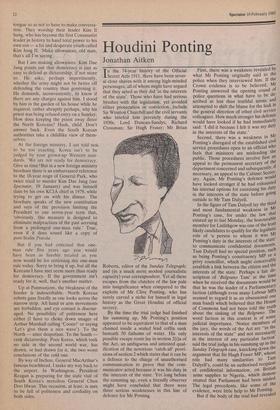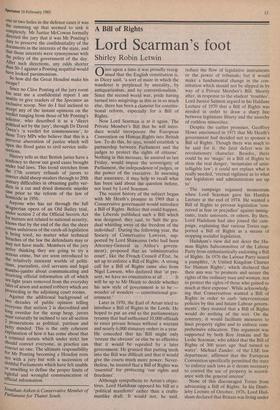Houdini Ponting
Jonathan Aitken
In the 74-year history of the Official Secret Acts 1911, there have been sever- al close shaves with it among high-minded personages, all of whom might have argued that they acted as they did 'in the interests of the state'. Those who have had serious brushes with the legislation, yet avoided either prosecution or conviction, include Sir Winston Churchill and the civil servants who briefed him privately during the 1930s; Lord Duncan-Sandys; Richard Crossman; Sir Hugh Fraser; Mr Brian Roberts, editor of the Sunday Telegraph; and (in a much more modest journalistic capacity) your correspondent. Yet all these escapes from the clutches of the law pale into insignificance when compared to the exploits of Mr Clive Ponting, who has surely carved a niche for himself in legal history as the Great Houdini of official secrecy.
By the time the trial judge had finished his summing up, Mr Ponting's, position appeared to be equivalent to that of a man chained inside a sealed lead coffin sunk beneath 50 fathoms of water. His only possible escape route lay in section 2(i)a of the Act, an ambiguous and untested qual- ification of the notorious 'catch-all' provi- sions of section 2 which states that it can be a defence to the charge of unauthorised communication to prove that the com- municator acted because it was his duty in the interests of the state. Yet long before the summing up, even a friendly observer might have concluded that there were three serious weaknesses in this line of defence for Mr Ponting. First, there was a weakness revealed by what Mr Ponting originally said to the police when they interviewed him. If the Crown evidence is to be believed, Mr Ponting answered the opening round of police questions in what have to be de- scribed as less than truthful terms and attempted to shift the blame for the leak In the general direction of other civil service colleagues. How much stronger his defence would have looked if he had immediately said: 'I did it because I felt it was my duty in the interests of the state.' Second, there was a weakness in Mr Ponting's disregard of the established civil service procedures open to an official who feels that ministers are misleading the public. Those procedures involve first an appeal to the permanent secretary of the rt depament concerned and subsequently, If necessary, an appeal to the Cabinet Secret- ary. Again, Mr Ponting's defence would have looked stronger if he had exhausted his internal options for exercising his duty in the interests of the state before going outside to Mr Tam Dalyell. In the figure of Tam Dalyell lay the third and most fundamental weakness in Mr Ponting's case, for under the law that existed up to last Monday, the honourable member for Linlithgow was one of the least likely candidates to qualify for the legalistic role of 'a person to whom it was Mr, Ponting's duty in the interests of the state' to communicate confidential documents. Tam Dalyell had no special position, such as being Ponting's constituency MP or a privy councillor, which might conceivably establish a link between the citizen and the interests of the state. Perhaps a fair de- scription of `Belgrano Tam' at the time when he received the documents would be that he was the leader of a Parliamentary faction (although even many Labour MPs seemed to regard it as an obsessional one man band) which believed that the House of Commons had not been told the truth about the sinking of the Belgrano. The word faction in this context is of some judicial importance. 'Notice members of the jury, the words of the Act are "in the interests of the state" and not necessarily in the interest of any particular faction said the trial judge in his summing up in the Sunday Telegraph case, knocking down the argument that Sir Hugh Fraser MP, whose role had many similarities to Tan" Dalyell's, could be an authorised recipient of confidential information, on British arms supplies to Nigeria, which demon- strated that Parliament had been misled. The legal precedents, like some of the evidence, were little help to Mr Ponting. But if the body of the trial had revealed one or two holes in the defence cases it was the summing up that seemed to sink it completely. Mr Justice McCowan formally directed the jury that it was Mr Ponting's duty to preserve the confidentiality of the documents in the interests of the state, and that those interests were synonymous with the policy of the government of the day. After such directions, any odds shorter than 50-1 against a Ponting acquittal would have looked parsimonious. So how did the Great Houdini make his escape?
Since no Clive Ponting of the jury room has sent me a confidential report I am unable to give readers of the Spectator an exclusive scoop. Nor do I feel inclined to accept any of the instant opinions on the verdict ranging from those of Mr Ponting's solicitor, who described it as a 'direct Political act by the jury', through Dr David Owen's 'a verdict for commonsense', to those Tory MPs who believe that this is a Perverse aberration of justice which will open the flood gates to civil service indis- cretions.
History tells us that British juries have a tendency to throw out good cases brought under bad laws. This trend stretches from the 17th century refusals of jurors to convict child sheep stealers through to 20th century difficulties in obtaining guilty ver- dicts in a cut and dried domestic murder case prior to the reform of the law of homicide in 1956.
Anyone who has sat through the full Wagnerian opera of an Old Bailey trial, under section 2 of the Official Secrets Act for matters not related to national security, knows that by the end of the day the sheer rotten unfairness of the catch-all legislation is being tried, no matter what technical breaches of the law the defendants may or may not have made. Members of the jury arrive thinking they are going to try a serious crime, but are soon introduced to the relatively innocent worlds of politi- cians, journalists, civil servants and legal Mumbo-jumbo about communicating and receiving official information all of which are light years removed from the everyday tales of arson and armed robbery which are Proceeding in the adjoining court rooms. Against the additional background of two decades of public opinion telling c, verYone that section 2 is discredited and long overdue for the scrap heap, jurors Must naturally be inclined to see all section 2 prosecutions as political, partisan and Petty minded. This is the only coherent explanation of how it has come about that a criminal statute which under strict law should convict everyone, in practice can convict no one. The ultimate responsibility for Mr Ponting becoming a Houdini rests not with a jury but with a succession of slothful Parliaments which have felt unable or unwilling to define the proper limits of rightful and wrongful communication of official information.
Jonathan Aitken is Conservative Member of Parliament for Thanes South.















































 Previous page
Previous page